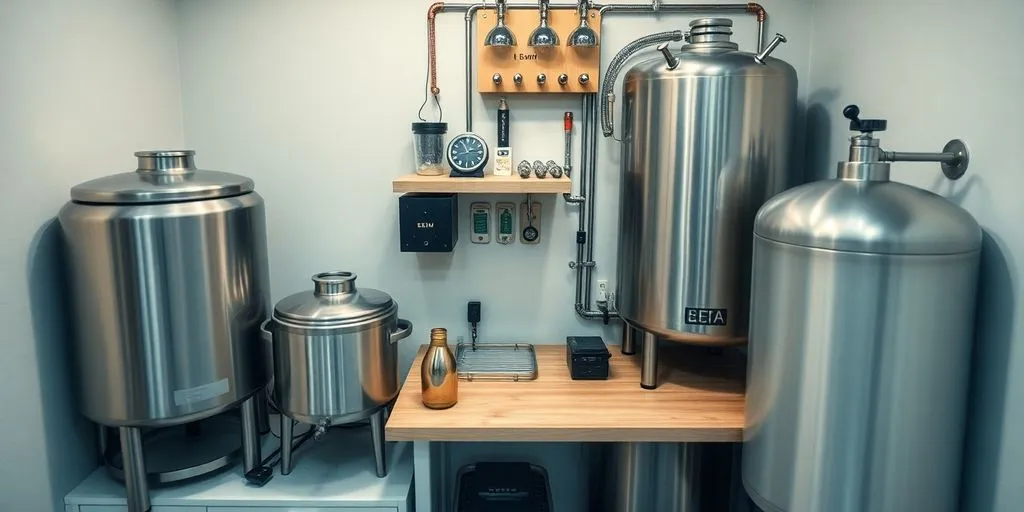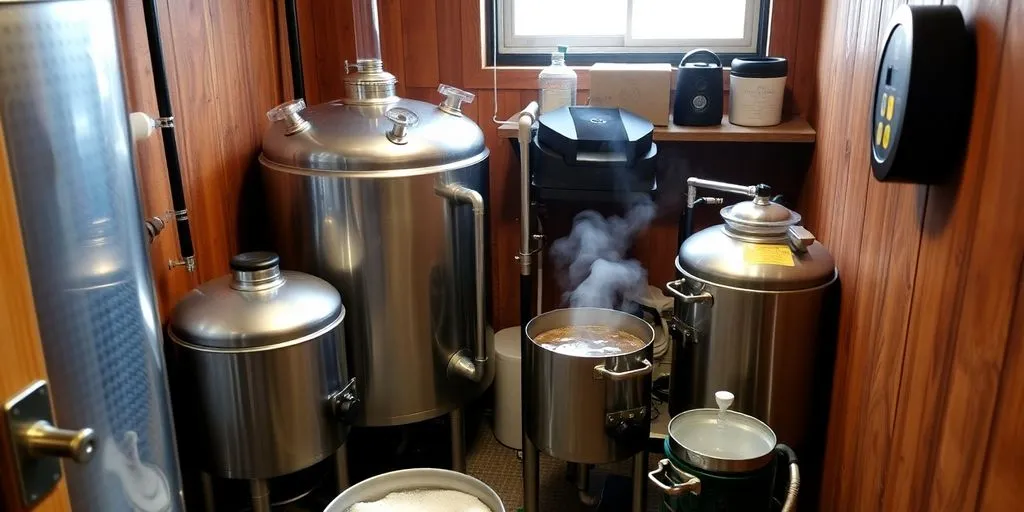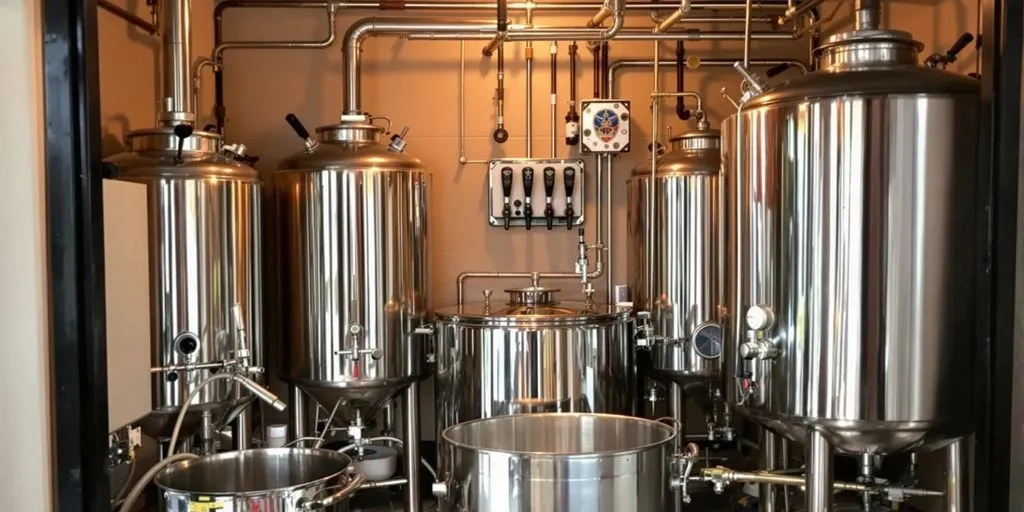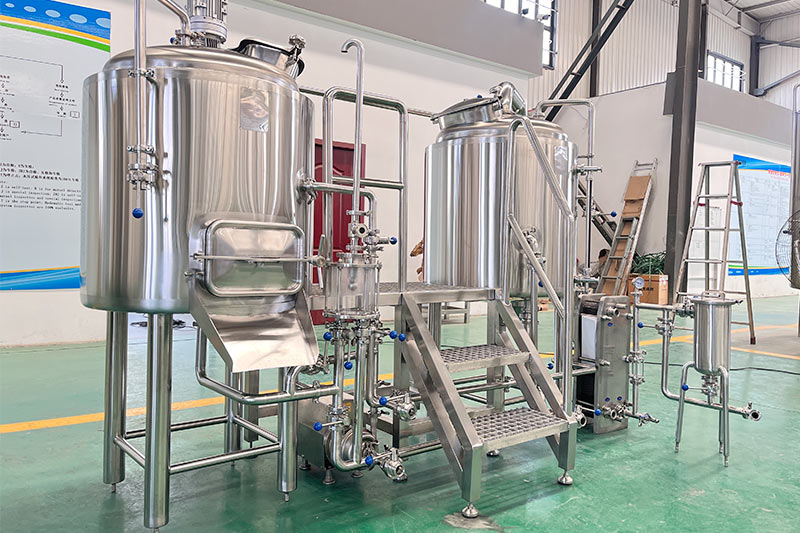Mini brewery equipment is becoming more popular as people want to brew their own beer at home or in small businesses. These compact systems offer a great way to enjoy brewing without needing a lot of space or money. In this article, we will explore the important parts of mini breweries, how to choose the right equipment, and tips for setting up and running your own mini brewery.

Key Takeaways
- Mini brewery equipment includes essential parts like kettles, fermenters, and cooling systems.
- Compact brewing systems save space and are more affordable than traditional setups.
- Choosing the right equipment depends on factors like budget, space, and brewing goals.
- Setting up a mini brewery requires careful planning for space, installation, and safety.
- Innovations in mini brewery equipment focus on technology, eco-friendliness, and customization options.
Understanding Mini Brewery Equipment
Key Components of Mini Breweries
A mini brewing system is a device designed for small-scale brewing. It typically includes several key parts:
- Mash Tun: Where grains are mixed with water to extract sugars.
- Fermentation Vessel: The container where yeast turns sugars into alcohol.
- Cooling System: Helps to cool down the wort after boiling.
Benefits of Compact Brewing Systems
Mini breweries offer many advantages:
- Space Efficiency: They fit in smaller areas, making them ideal for homes or small businesses.
- Cost-Effective: Lower initial investment compared to larger setups.
- Flexibility: Easier to experiment with different recipes and styles.
How Mini Breweries Differ from Traditional Setups
Mini breweries are different from traditional ones in several ways:
- Size: They are much smaller and easier to manage.
- Production Volume: They produce less beer, which is great for local markets.
- Customization: Many mini systems allow for unique brewing options that larger systems may not offer.
Mini breweries are a great way to start brewing at home or in a small business. They provide a fun and creative outlet for beer lovers!
Choosing the Right Mini Brewery Equipment
When starting a small scale brewery, selecting the right equipment is crucial for success. Here are some key points to consider:
Factors to Consider When Selecting Equipment
- Space: Ensure you have enough room for your brewing setup.
- Budget: Determine how much you can spend on equipment.
- Brewing Capacity: Choose equipment that matches your brewing goals.
Top Brands for Mini Brewery Equipment
Some popular brands known for their quality mini brewery equipment include:
- Brewzilla
- Grainfather
- Anvil Brewing
Cost-Effective Options for Beginners
If you’re just starting out, consider these affordable options:
- Homebrew Kits: Great for beginners and usually come with everything you need.
- Used Equipment: Check local listings for second-hand brewing gear.
- DIY Solutions: Build your own equipment to save money.
Choosing the right equipment can make or break your brewing experience. This guide will walk you through everything you need to know, from equipment to processes, space requirements, and the nitty-gritty details of running a successful mini brewery.
Setting Up Your Mini Brewery
Space Requirements for Mini Breweries
When planning your mini brewery, space is crucial. Here are some key points to consider:
- Size: Ensure you have enough room for equipment and storage.
- Ventilation: Good airflow is important for safety and comfort.
- Accessibility: Make sure you can easily reach all equipment.
Installation Tips for Compact Brewing Systems
Setting up your brewing system can be straightforward if you follow these tips:
- Read the manual: Always start by understanding your equipment.
- Level the ground: Ensure your brewing area is flat to avoid spills.
- Connect utilities: Make sure water, electricity, and drainage are properly set up.
Safety Considerations in Small-Scale Brewing
Safety should always come first. Here are some important safety tips:
- Wear protective gear: Gloves and goggles can prevent injuries.
- Keep a fire extinguisher nearby: Always be prepared for emergencies.
- Follow local regulations: Make sure you comply with health and safety laws.
Setting up a mini brewery can be a fun and rewarding experience, but it’s important to plan carefully to ensure everything runs smoothly.
In summary, understanding the space requirements, following proper installation tips, and prioritizing safety will help you create a successful mini brewery. Remember, the right setup can make all the difference in your brewing journey!
Operating Your Mini Brewery Efficiently
Optimizing Brewing Processes
To make the most of your mini brewery, consider these key strategies:
- Plan your brewing schedule to maximize efficiency.
- Use quality ingredients to enhance flavor and reduce waste.
- Keep a detailed record of your brews to learn from each batch.
Maintaining Equipment for Longevity
Regular maintenance is crucial for keeping your equipment in top shape. Here are some tips:
- Clean your brewing equipment after each use.
- Check for leaks and fix them immediately.
- Replace worn-out parts to avoid bigger problems later.
Troubleshooting Common Issues
Even the best breweries face challenges. Here’s how to tackle some common problems:
- If your beer tastes off, check your ingredients and equipment.
- If fermentation is slow, ensure the temperature is right.
- If you notice leaks, inspect seals and connections.
Remember, keeping your brewery running smoothly is key to producing great beer.
Scaling Up: From Mini to Microbrewery

When to Consider Expanding
As your brewing skills improve and your customer base grows, you might think about moving from a mini brewery to a microbrewery. Here are some signs that it might be time to expand:
- Increased demand for your brews
- Limited production capacity with current equipment
- Desire to explore new beer styles and recipes
Challenges in Scaling Brewing Operations
Transitioning to a microbrewery comes with its own set of challenges. Here are a few to keep in mind:
- Higher initial costs for larger equipment and facilities.
- Navigating regulatory requirements that come with larger operations.
- Managing a larger team and ensuring everyone is trained properly.
Success Stories of Breweries That Started Small
Many successful breweries began as small operations. Here are a few examples:
- Brewery A: Started with a 10l pressure fermenter and now produces thousands of liters.
- Brewery B: Began in a garage and expanded to a full-scale microbrewery within five years.
- Brewery C: Focused on local sales and grew their brand through community engagement.
Expanding from a mini brewery to a microbrewery can be a rewarding journey, but it requires careful planning and execution. Understanding your market and production capabilities is key to a successful transition.
Innovations in Mini Brewery Equipment
Latest Technological Advancements
In recent years, mini breweries have seen exciting new technologies that make brewing easier and more efficient. Some of these advancements include:
- Automated systems that help reduce manual work and mistakes.
- Smart brewing equipment that can be controlled from your phone.
- Compact fermentation tanks that save space while improving quality.
Eco-Friendly Brewing Solutions
Many mini breweries are now focusing on being more environmentally friendly. Here are some ways they are doing this:
- Using solar panels to power their equipment.
- Recycling water used in the brewing process.
- Sourcing local ingredients to cut down on transportation emissions.
Customizable Features for Unique Brews
One of the best parts about mini breweries is the ability to create unique beers. Many new systems offer:
- Adjustable temperature controls for different beer styles.
- Modular setups that allow brewers to add or change equipment easily.
- Options for adding flavors and ingredients during the brewing process.
Mini breweries are not just about making beer; they are about creating a unique experience and product that reflects the brewer’s passion and creativity.
Marketing Your Mini Brewery Products

Building a Brand Around Your Brews
Creating a strong brand is essential for your mini brewery. Your brand should reflect your unique style and values. Here are some key points to consider:
- Choose a memorable name.
- Design an eye-catching logo.
- Develop a consistent theme for your packaging and marketing materials.
Effective Sales Channels for Small Breweries
To reach more customers, you need to use various sales channels. Here are some effective options:
- Local farmers’ markets.
- Online sales through your website.
- Collaborations with local restaurants and bars.
Engaging with the Local Community
Connecting with your community can help grow your customer base. Consider these ideas:
- Host brewery events like tastings and food pairings.
- Participate in local festivals and fairs.
- Offer brewery tours to show how your beer is made.
Engaging with your community not only builds loyalty but also creates a network of support for your brewery.
By focusing on these areas, you can effectively market your mini brewery products and attract more customers.
Final Thoughts on Mini Brewery Equipment
In conclusion, mini brewery equipment offers a great way for anyone to start brewing their own beer at home. These compact and affordable tools make it easy to create delicious drinks without needing a lot of space or money. Whether you are a beginner or someone with more experience, these small setups can help you explore your brewing skills. So, if you’ve been thinking about trying your hand at brewing, now is the perfect time to dive in and enjoy the fun of making your own beer!Contact us to learn more and let our products and services bring you experience like never before!
Frequently Asked Questions
Mini brewery equipment includes small-scale tools and machines used to make beer at home or in small businesses. These setups are designed to be compact and easy to use.
Using a mini brewery is great because it saves space and money. It allows you to brew your own beer, experiment with flavors, and share your creations with friends.
A mini brewery works by heating water and mixing it with malted grains to create a mash. Then, you add hops for flavor, ferment the mixture, and finally bottle the beer.
Yes, you can start a mini brewery without spending a lot of money. There are many affordable equipment options available that are perfect for beginners.
To set up a mini brewery, you need some basic equipment like a brewing kettle, fermentation container, and bottles. You also need ingredients like water, malt, and hops.
Maintaining mini brewery equipment is not too hard. Regular cleaning and checking for any issues can help keep everything in good shape for a long time.

